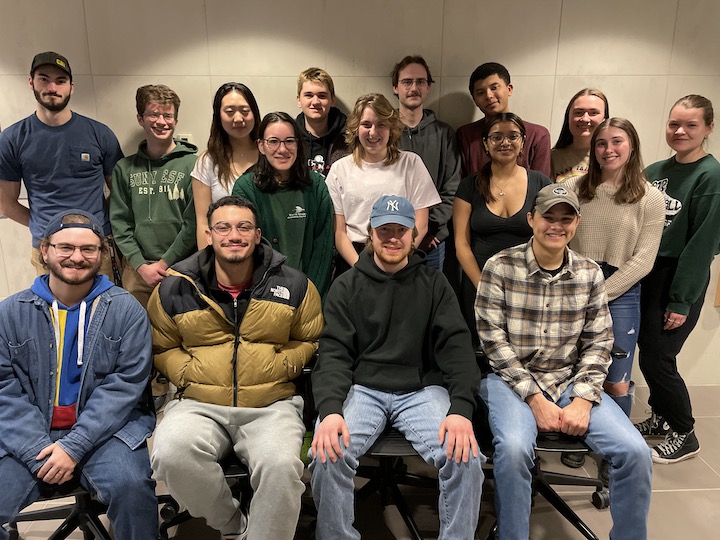Recent Headlines

ESF-SU 2023 Solar Decathlon team
ESF-SU Solar Decathlon Team Heads to Finals
A zero-energy building that helps mitigate climate change and support the redevelopment of Syracuse earned the solar decathlon team from the SUNY College of Environmental Science and Forestry (ESF) and Syracuse University (SU) a return to the U.S. Department of Energy Solar Decathlon Design Challenge finals.
The ESF-SU team will travel to Colorado April 20-23, where their entry in the Multifamily Building Division category will go against teams from nine other colleges from across the country and Canada.
Students work in multidisciplinary teams to create innovative and high-performance building designs that address real-world issues related to climate change, affordability, and environmental justice.
The ESF-SU design would be located in Syracuse’s 15th Ward near I-81, an area the Syracuse Housing Authority is working on revitalizing near I-81. Along with being zero-energy, it’s also designed with environmental justice issues such as affordability in mind to address Syracuse’s poverty issues. The city has the second-highest percentage of families in the nation getting by on less than $10,000 a year, according to data from the Census Bureau.
The decathlon team’s building is designed to house 150 residents and would be home to senior citizens and survivors of domestic violence.
“Our design is located in Syracuse to help the community,” said Anna Marino, a senior environmental science major focused on renewable energy. “Including affordable, low-income housing was really important to the team.”
“ESF’s history of success at the decathlon is indicative of the success of our academic programs and our students’ dedication to identify problems, find solutions, and bring them to fruition,” said ESF President Joanie Mahoney.
Finalists were selected at the Semifinal Competition Event, held virtually Feb. 24–25. Teams presented their designs to a panel of industry experts with finalists selected based on their innovations, technical plans, and the quality of their presentations.
“For most schools and most students, the competition is an ‘assignment,’” said Paul Crovella, professor in the Department of Sustainability Resources Management and team advisor. “For the ESF students, this is a mission. Our students know that we need to improve our world and the way we build, and they want to be the leaders to show the construction industry how to do this.”
The team meets four hours each week to work on the project. “It's not a class,” said Marino “We're reaching out to professors for help because we want to learn more. The team is working hard ‘just because.’”
“The whole competition is obviously about sustainability and green buildings, but since ESF is sucha niche school for that type of thing we had an upper hand,” she said. “Other colleges are just architecture or technology where we have landscape architects, environmental scientists, environmental studies, and SU architecture students.”
It was the environmental background that gave the team an edge.
“Having that environmental background was a big help for us because we knew things going into the competition that other schools still had to learn about. And everybody here cares so much about the environment already,” Marino said.
This is the fifth time the ESF-SU team has submitted a proposal as part of this competition and the fifth time they’ve been chosen as a finalist.
In 2014 they beat 20 schools, including teams from Auburn, Clemson, George Tech, and Penn State.
“If this were football, and ESF beat these teams, the streak of games would go down as the greatest upsets in the history of sports,” said Crovella, obviously proud of ESF’s dominating decathlon reputation.
Although it took a few years, the 2014 home was eventually built in Troy, New York as part of a youth program effort to revitalize their neighborhood.
In 2019 the team beat 19 teams, including entries from Germany and India. Again, a host of top universities were bested by the ESF-SU submission.
And in 2020, the team intentionally broke the competition rules to meet the needs of autistic young adults needing housing, according to Crovella. “While the judges couldn’t award them a prize, the judges also broke the rules and created a new category for special recognition of their submission.”
This year, the team will compete against teams from Carleton University, Concordia University, Illinois Institute of Technology, Northeastern University, Toronto Metropolitan University, University of Cincinnati, University of California Los Angeles, University of Minnesota Twin Cities, Virginia Polytechnic Institute and State University, Alexandria, Virginia.
2023 Solar Decathlon Team
- Anna Marino - Environmental Science, senior, student team lead
- Adam Perry - Environmental Science, senior, energy lead
- Julia Gilfillan - Sustainable Energy Management, senior, energy lead
- Matt Lynch - Environmental Science, junior, design team lead
- Anna-Carole Samson - Environmental Science, senior, energy lead
- Aleksandar Djordjevic - Sustainable Energy Management, senior, treasurer
- Madeleine Best – Architecture, Syracuse University, sophomore
- David George - Sustainable Energy Management, senior
- Waseka Ahmed - Environmental Studies, junior
- Joshua Jacobs - Environmental Studies, senior
- Kit Radley – Architecture, SU, first-year
- Massimo DeFrancesco - Environmental Science, junior
- Orion Ijeh - Sustainable Energy Management, sophomore
- Bradley Rush - Landscape Architecture, senior
- Brian Peters - Landscape Architecture, senior
- Matthew Williams – Architecture, Syracuse University, sophomore
- Catherine Li – Architecture, Syracuse University, first-year
- Michael Sirico - Landscape Architecture, senior
- Keagan Drago-Leaf - Landscape Architecture, senior